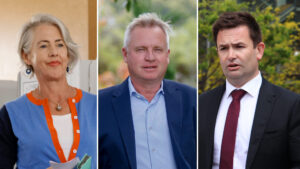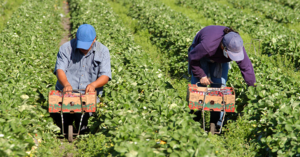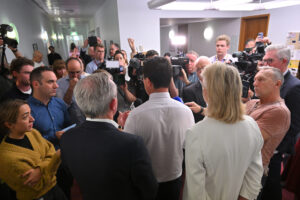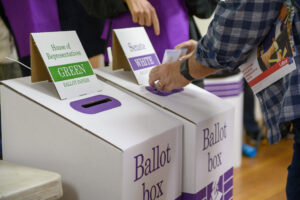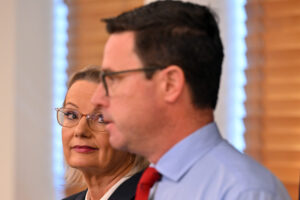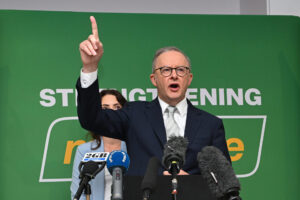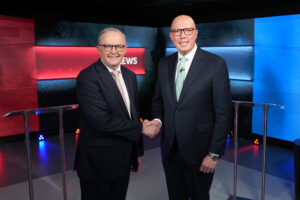Opinions
June 2025
Here’s something absolutely cooked about books in Australia
It’s a big week for Australian culture, with announcement of the shortlist for the Miles Franklin Literary Award, one of the country’s top writing prizes.
As the US chooses destruction over diplomacy in Iran, Australia has to decide between principle and prostration
Australia, like Little Sir Echo, whimpers after the world’s premier bully bombs the ‘bully of the Middle East’.
Australian CEOs are still getting their bonuses. Performance doesn’t seem to matter so much.
Almost all of Australia’s top chief executives are, according to their boards at least, knocking it out of the park in terms of performance.
Do you have $3 million in super? Me neither. These changes will actually help you
Labor’s planned reforms to superannuation tax concessions may be being reported as “controversial” but the fact is they are popular.
If events around the world are sending you insane you’re not alone, and there’s a name for it
If you feel like you are going a little insane at the moment, you’re not alone.
Support for super tax reform among young, women makes Coalition’s dissent a real puzzle
Predictably, the Liberal Party is opposing reforms that would reduce tax concessions on money made from superannuation balances above $3 million. But its stance is out of touch with the public mood.
The system is working, but big parties must heed voters and engage with minor parties
Tasmanians keep voting for a power-sharing parliament over the wishes of the major parties.
Where the ACT could claw back more than half a billion dollars
The GST was supposed to solve the states and territories’ financial problems.
A fair go for temporary workers from the Pacific
On a whistlestop tour of Fiji, Tonga, and Vanuatu in May, Foreign Minister Penny Wong wanted to focus on climate change, security, and aid funding.
Trump has long speculated about using force against his own people. Now he has the pretext to do so
“You just [expletive] shot the reporter!” Australian journalist Lauren Tomasi was in the middle of a live cross, covering the protests against the Trump administration’s mass deportation policy in Los Angeles, California. As Tomasi spoke to the camera, microphone in hand, an LAPD officer in the background appeared to target her directly, hitting her in
Hearing voices: why the Nats should be watching their backs
The community independent movement did not begin in Sydney or Melbourne, but in the bush.
Unfettered gambling advertising means young Australians are losing big
If you’re sick of ads for sport betting interrupting the footy – or anything else you watch on TV – you’re probably not alone.
Australia must resist US bullying to increase military spending
The US secretary of defense, Pete Hegseth, may not be the sharpest tool in President Trump’s tool kit. But, in the great American tradition, he is a top hustler. In an arrogant display that would have won Trump’s approval, Hegseth blustered his way around the Shangri-La conference in Singapore’s clammy weather last week in what resembled an ugly American charm offensive. He omitted tariffs, though these were front of mind for everyone else.
Australians should be proud of our preferential voting, but there is an alternative
A record number of Australians voted for independents and minor parties at the most recent federal election election.
May 2025
Great gas giveaway: $215 billion in royalty-free gas for Woodside’s North West Shelf project
A 50-year extension to the North West Shelf (NWS) project in Western Australia would see huge amounts of gas given away with no return for Australians.
Why you shouldn’t be scared of these super changes
The election might be over, but the next big scare campaign is just getting started. The subject this time is the Albanese government’s planned changes to taxes on superannuation.
How the government is setting everyone up to fail on green claims
If a private company ran a scheme that misled consumers, inflated investor confidence, and exposed its clients to legal risk, we would expect the government to shut it down.
The rise of early voting in Australian elections
Are voters missing out on more than their democracy sausage?
One way to improve the “dumpster fire of dumb stuff” which is Australia’s housing policy
Everyone agrees we need to do something about housing in Australia. But first we need to ask a very obvious, but often ignored question: what is housing is for?
Coalition’s on-again, off-again ‘situationship’ has even those closest baffled
If anyone knows what is going on in the National party, could you please stand up? Interested parties in the Nationals would love to know.
Why Dutton’s ‘one tune’ division and animosity didn’t work for Australians
Friends, Australians, countrymen, we come to bury Peter Dutton, not to praise him.
Business groups want the government to overhaul the tax system? Excellent – we have some ideas.
The landslide win by the ALP has seen business groups come out demanding the government listen to their demands despite having provided them no support, and plenty of opposition, over the past 3 years.
Australia rejected the Dutton-Murdoch agenda, now we’ll see if Labor does the same
We are about to see who the Australian Labor Party really is, in 2025.
Knee-jerk anti-Chinese redbaiting in Australian elections
In the final days of the campaign, independent MP Monique Ryan and Labor’s housing minister Clare O’Neil faced questions about the support of the Hubei Association for their respective campaigns.
More senators for the ACT: Unity ticket, bar one
A four-way debate on ABC Radio Canberra on 1 May produced a rare moment of unity between election candidates. The main candidates for the ACT’s two senate seats agreed that Canberra needs more senators.
Election entrée: Dark money and your money pay for most of the political ads you’re seeing
At this stage of the election, you have no doubt seen plenty of political ads.
April 2025
Election entrée: Longest wait for results
After the 2010 election, independent crossbenchers negotiated for 17 days with Prime Minister Julia Gillard and Opposition Leader Tony Abbott to decide who to support.
Election entrée: Feel the election campaign has dragged on? It could have been longer
Election campaigns come and go, but some go faster than others.
More kids gamble than play ‘popular’ sports. Yet our leaders are too weak to put up a fight
Football, meat pies, kangaroos and gambling – there’s nothing more Australian.
Election entrée: Preference pile-ons
Last election, independent Kylea Tink won the seat of North Sydney on a primary vote of 25%.
General Enquiries
Emily Bird Office Manager
mail@australiainstitute.org.au
Media Enquiries
Glenn Connley Senior Media Advisor
glenn.connley@australiainstitute.org.au






